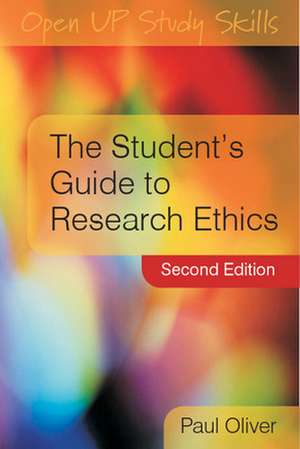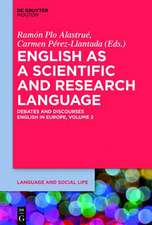The Student's Guide to Research Ethics
Autor Paul Oliveren Limba Engleză Paperback – 16 apr 2010
- What constitutes ethical research?
- How can best practice be maintained throughout a research project?
This new edition is thoroughly updated to reflect the greater emphasis researchers must now place on ethics and includes information on:
- Ethical concerns of the internet and technology
- Regulatory frameworks and research governance
- Ethical requirements of funding bodies
- The involvement of research participants in research design
- Codes of ethics within different disciplines
Preț: 191.70 lei
Nou
36.68€ • 38.30$ • 30.36£
Carte disponibilă
Livrare economică 14-28 martie
Livrare express 27 februarie-05 martie pentru 22.22 lei
Specificații
ISBN-10: 0335237975
Pagini: 224
Ilustrații: black & white illustrations
Dimensiuni: 155 x 230 x 10 mm
Greutate: 0.32 kg
Ediția:2 Rev ed.
Editura: McGraw Hill Education
Colecția Open University Press
Locul publicării:United Kingdom
Cuprins
PART ONE Ethics and the research process Introduction: ethics and research
Some terminological issues: participants, subjects or respondents?
Ethics and research aims
Moral justifications of research
Situations where engaging in research may be ethically undesirable
Responsibilities of researchers to fellow researchers, respondents, the public and the academic community
Areas of research which raise ethical issues
Research and the respondent: ethical issues before the research commences
Procedures for identifying and recruiting potential respondents
The principle of informed consent
Written information on the research project, and obtaining
written consent
Potential disadvantage or harm which might affect respondents
Will respondents be likely to gain in any way from participationin the research?
The involvement of research participants in research design
Researching vulnerable groups of people
Obtaining access to the research field via ‘gatekeepers'
The role of ethics committees and boards
Obtaining relevant permission to conduct research
Reaching agreement with institutions or organizations in
which research will be conducted
Research and the respondent: ethical issues during the research
The ethics of recording data
The right of respondents to end involvement in the research
The disclosure by respondents of sensitive material
Ethical issues in the use of information and communication technology
The ethics of ethnographic fieldwork
The ethics of the research interview
Ethical issues in the use of questionnaires
The use of inducements to provide data
Is it ever ethical to collect data from respondents using deception or covert methods?
Research and the respondent: ethical issues when data collection has been completed
The issue of allowing respondents to read, edit and confirm the accuracy of data
Reporting research results to respondents
Arrangements for the disposal of raw data
Potential psychological effects on respondents
The distinction between interview research and counselling
Possible consequences when the respondent remains in the research contextPART TWO Ethical themes
The privacy of respondents, and restrictions on the use of data
Anonymity
Confidentiality
Trying to maintain the social ecology of a research setting
Observational studies in a public setting
Privacy in relation to institutions and organizations
The storage of data
Differences in the research context
Cultural differences
Gender differences
Differences of ethnicity
Religious differences
The collection of data when the researcher is of a different
culture or gender from that of respondents
Issues specific to research in a health or social care context
The funding and sponsorship of research
Ethics and funding agreements
The ethics of research contracts
The resolution of potential conflicts of interest
The issue of allowing sponsors to read or edit draft research reports
Intellectual ownership
Regulatory Frameworks and Research Governance
Codes of Ethics within different disciplines
Ethical concerns when using the Internet and Technology
Contacting respondents
Collecting data using the internet
Collecting data from internet sources
Privacy on the internet
The publication and dissemination of research
Different audiences for research reports and findings
Editorial procedures in academic journals
The nature of plagiarism
The style of expression of academic judgements
Establishing authorship
Acting as a reviewer of academic material
The uses of synopses of research
Acknowledging the limitations of research conclusions
Conclusion: the role of the researcher
Representation of research findings to non-researchers
Recognition of the value of different research methodologies
Consultation with peers on complex ethical issues
Using forms of communication and language which are appropriate to the context
The benefits and disadvantages of being a research participant
Some principles for trying to resolve ethical dilemmas in research
References
Index
Descriere
- Why should every researcher consider the ethical implications of their work?
- What constitutes ethical research?
- How can best practice be maintained throughout a research project?
This new edition is thoroughly updated to reflect the greater emphasis researchers must now place on ethics and includes information on:- Ethical concerns of the internet and technology
- Regulatory frameworks and research governance
- Ethical requirements of funding bodies
- The involvement of research participants in research design
- Codes of ethics within different disciplines

















